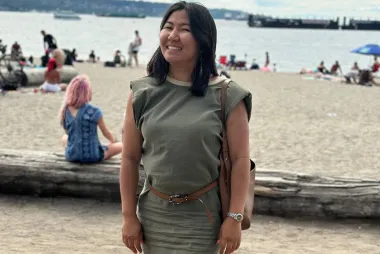“Whether you are meeting someone for the first time, interviewing for a job or you’re pitching an idea to an investor, telling a compelling story will set you apart.”

Balpreet Kukreja
- Degree:
- Master of Engineering Leadership
- Grad year: 2019
- Program:
- Campus: Vancouver
Balpreet’s background was in mechanical engineering before he fuelled his passion for clean technology by pursuing a master’s degree in clean energy engineering — part of UBC’s Master of Engineering Leadership (MEL) program. He worked with his peers and the Clean Energy Research Centre to develop technical and financial models for a solar-powered microgrid atop Thunderbird Parkade, which included electric vehicle charging, hydrogen production and energy storage. He also completed a lifecycle analysis of electric vehicles with the City of Vancouver, showing their significant benefits over conventional internal combustion engine vehicles. Finally, he was one of the faces of UBC’s “The potential is yours” campaign.
Why did you choose engineering?
From a young age, I always asked “why?”. Why is the sky blue; why does night follow day; why can’t I have all the Lego sets in the world? To feed this curiosity, and to relieve my parents and siblings from the incessant questions, I was drawn to science and math to learn more. This coupled with my love for building things with my hands to make engineering a clear choice for me.
What have you learned in engineering that is most valuable?
One of the most valuable skills you can learn is the ability to tell a great story. Whether you are meeting someone for the first time, interviewing for a job or you’re pitching an idea to an investor, telling a compelling story will set you apart.
This is especially important in engineering: if you have an idea to solve a problem you notice, not communicating it effectively may neuter the idea in its infancy. Great storytelling is also a key component of innovation — which some define as “the process of creating value by applying novel solutions to meaningful problems.” I was able to put this into practice working with an amazing team that included my peers Bernardo Ruz and M.K. Anand, along with our faculty advisor at the Clean Energy Research Centre, Omar Herrera. We developed technical and financial models for a solar-powered microgrid that includes high-voltage electric vehicle charging infrastructure, hydrogen production and fuelling, and battery-based energy storage.
What has made your time at UBC the most memorable?
The incredible energy on campus! There is so much going on at any given moment — whether it’s an archery club, entrepreneurship workshop or a meditation group. In addition to excelling academically in your chosen field, I found that doing something just a little outside your comfort zone is where the most significant personal growth can happen. UBC has countless ways to explore this. It was also really memorable to meet such diverse people, students and faculty alike, with fascinating stories and the friendships that came from that.
What has been your most memorable/valuable non-academic experience studying engineering at UBC?
I had the opportunity to be one of the faces of UBC’s “The potential is yours” campaign. Through this project, I met some remarkable people that are doing ground-breaking work at the university. The campaign embodies UBC’s motto: Tuum Est — roughly translated to “it is up to you” or “it is yours” — and cements the university’s reputation to encourage and inspire individuals, providing tools and the means to achieve anything you could imagine.
How will you go on to make a difference in our world?
I am excited by the opportunities that exist in the clean energy space. While we are heavily reliant on fossil fuels, huge strides have been made in clean technology and it is fast becoming economically unfeasible to ignore clean energy. The best way to scale such technology is to start locally then grow globally. There is significant opportunity and political will in British Columbia for clean technology, along with a substantial bank of brainpower — I want to leverage this to develop a scalable clean energy technology that will wean us off of our carbon diet, adding value and allowing us to create a world better than what we found.


